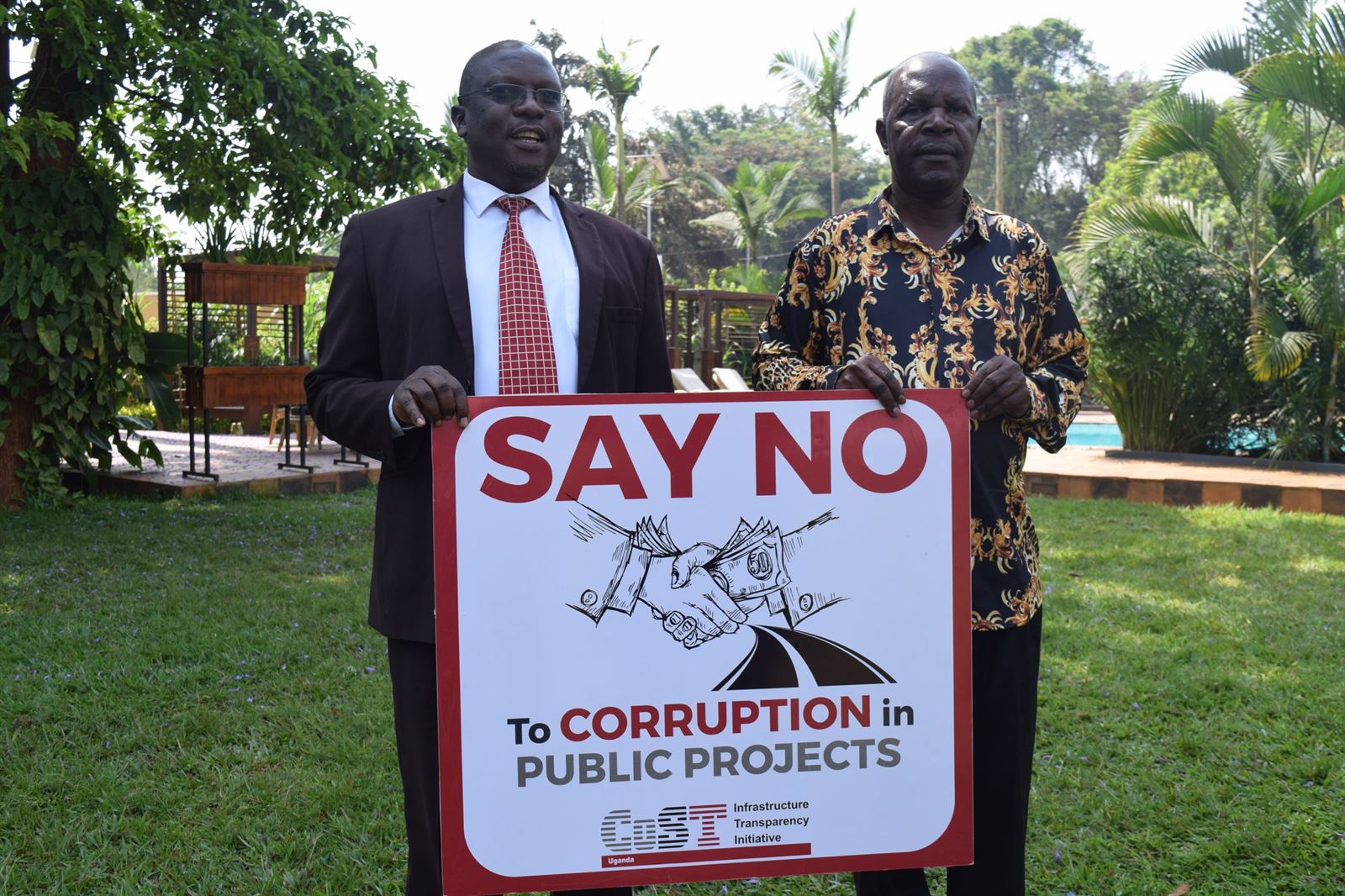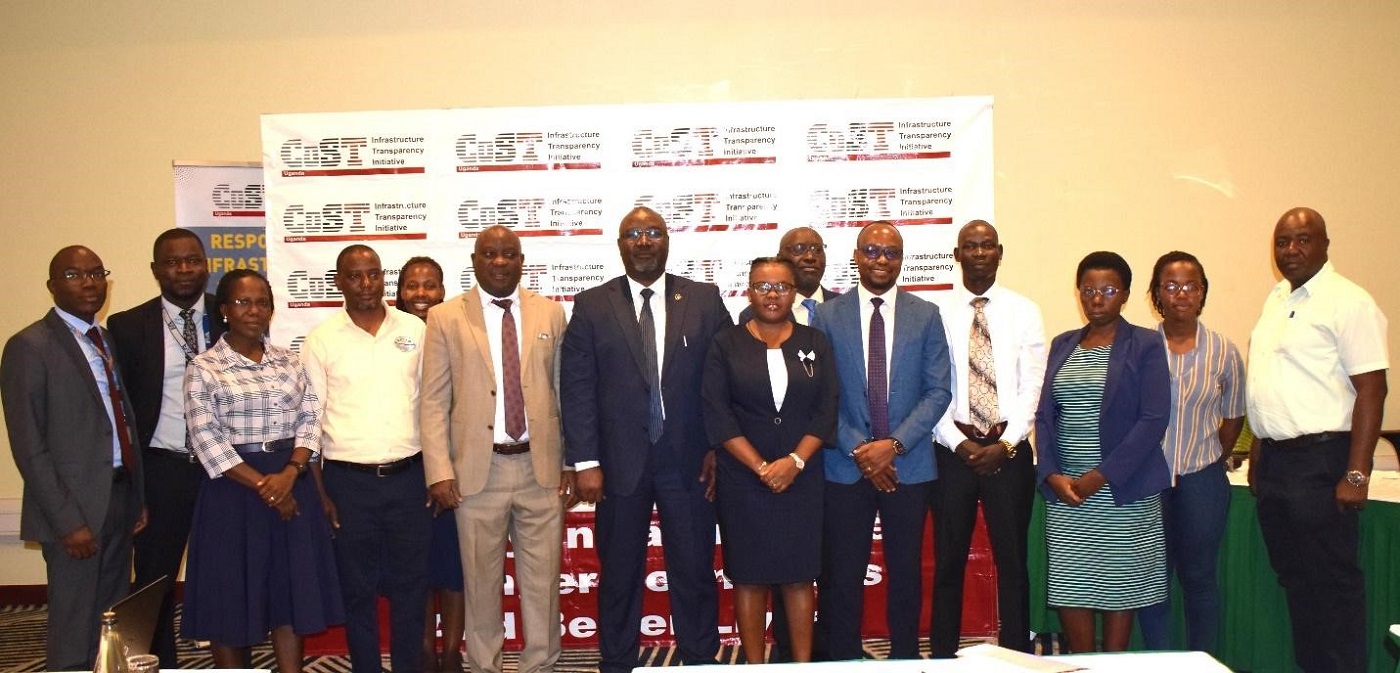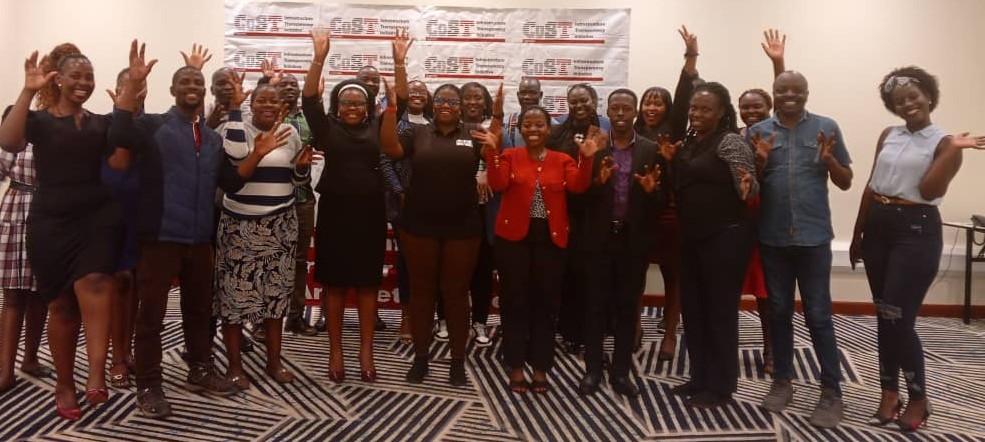
Transparency and performance of infrastructure procurement processes in Uganda have been associated with integrity issues and corruption risks. The 4th Procurement Integrity Survey by Public Procurement and Disposal of Public Assets Authority (PPDA) revealed that 20% of respondents reported to have ever paid a bribe. Out of these 30 percent of suppliers say they have paid a bribe between 1- 4 percent of contract value, another 30 percent say they have paid a bribe between 10- 20 percent while 23 percent, say the value of contract paid out as bribe is 5-9 percent. 16 percent of suppliers cannot estimate the value of contract paid out as bribe.
In her remarks, Ms. Olive Kabatwairwe, the CoST Uganda Programme Coordinator shared some of the integrity issues observed through the CoST Assurance process and stakeholder engagements including; low disclosure limiting competition – 51% of the data in the CoST IDS is not disclosed to the public, disclosed data is complex and not categorized, 71% of the citizens are not satisfied with the level of involvement in infrastructure delivery processes, use of non-competitive procurement methods, influence peddling most common in Local Governments, theft of materials and signage provisions, use of substandard materials, inadequate contractor capacity, poor site management and supervision, design changes during construction and implementation with incomplete or improper designs, unjustifiable time and cost overruns, delays in procurement leading to collusion and corruption, poor planning and scheduling, lack of compliance with local content provisions, handover of incomplete works and site abandoning, limited or no community engagement. She also noted that “following these observations, CoST Uganda encourages all stakeholder to embrace the platform that will enable discussion on key integrity issues in the sector and identify measures, lessons for addressing them, in addition, the engagements will be run as webinars, and would eventually revolve into physical engagements in the medium term, the idea is to provide a platform for stakeholders to engage, discuss and identify solutions, share experiences on regaining integrity in the sector”
These and many other issues were top on discussion at the inaugural webinar series on integrity issues in public infrastructure delivery processes, held on 8th December 2020. These webinars are coordinated by CoST Uganda and co-facilitated by PPDA and the Directorate for Ethics and Integrity. The webinar was attended by over 40 participants from the Government, Private Sector (Consulting Engineers and Contractors), the Civil Society Organizations, the media and citizens.
CoST Uganda’s recent data analysis report revealed that 51% of the required data in the Infrastructure Data Standard (IDS) and the Open Contracting for Infrastructure Data Standard (OC4IDS) was not disclosed. Low levels of disclosure affect private sector’s ability to prepare bankable bids and compete favorably in the market. Low disclosure breeds to corruption and bribes in procurement. Our engagements with PPDA and other Government agencies, through trainings and the Assurance process have progressively revealed an increasing interest by Government, to disclose more information, but, these commitments are yet to be actualized. Low/lack of disclosure and poor performance of infrastructure projects has also been attributed to attitude and mindset challenges associated to stakeholders engaging without integrity.
Public procurement of infrastructure projects is one of the key areas where the public sector and the private sector interact financially; it is a prime candidate for corrupt activity, cronyism, and favoritism, as well as outright bribery. Corruption in procurement in Uganda manifests itself in unnecessary projects, substandard work or unnecessarily expensive work; the diversion of resources; and unjustified or unexpected price increases. While major principles that govern public procurement, including transparency, fairness, and competition (OECD, 2017), apply consistently, inefficiencies in public infrastructure procurement enclosed by unnecessary bribes resulting from a lack of information have increased in Uganda.
Sharing key issues for all stakeholders to take action on, from the PPDA Procurement integrity survey and audit reports, Ms. Doreen Kyazze, the Manager Performance Monitoring, PPDA, noted that, corrupt behavior is perverse where procurement officers have no sense of service when working in public institutions. The low awareness or lack of courage to denounce corrupt behavior and situations is conducive for corruption. I wan
Signing contracts above the estimated market price, Solicitation documents issued to bidders included inadequacies such as use of wrong evaluation methodologies, lacked detailed technical evaluation criteria, bid validity periods not stated. Contractors fail to adequately meet their contractual obligations such as completion of contracts outside stipulated contractual periods, shoddy works and abandoned works. Irregular payments Irregular evaluation of bids, Failure to appoint contract managers: There is no evidence to indicate that User Departments nominate contract supervisors for appointment by the Accounting Officers. Low bidder participation: Bidder participation amongst Entities is low last year averaging 2.4. Delay in report preparations, and submission, Submission of performance guarantees that do not cover the entire contract periods, lack of road equipment, Failure to hire road gangs to manually maintain opened roads, staffing capacity gaps. There is limited or no evidence of involvement of Environmental Officers in the implementation of works under force account mechanism.
Mr. Robinson Oduka, the Senior Ethics Officer, Directorate for Ethics and Integrity, speaking about the Code of Conduct for the Private Sector and the National Ethical values and what they mean to stakeholders in the public infrastructure delivery processes noted that the foundation of any credible government is the trust of the people/citizens. This is because the government is, but a consolidation of trust and power of the people entrusted on a few. This consolidated power is built on trust that the few entrusted would plan, provide and manage the common good of the people. Provision of public infrastructure is therefore an obligation of the state to the people whom it draws power. Good read network, Dams, efficient health system, reliable power supply for production are among these infrastructures. As such, this is the Social Construct/contract between the State and the Citizens.
Uganda has an Ethical Values policy which was launched on 8th October 2013 by H.E the President of the Republic of Uganda. He noted that, These Values provide the general ideals of Uganda, but nevertheless, unless they are operationalized, they remain in utopia. To operationalize these values, we need to move a step further to inculcate them in our life and apply them in providing remedial actions to our daily challenges.
Addressing integrity issues in public infrastructure delivery therefore would be more effective if we operationalize the value system of Uganda. Creating a culture of integrity is the fundamental pillar in delivering the social good. Without the moral infrastructure, the public infrastructure cannot be delivered at the right time, in the right quality and quantity to fulfil its purpose. He asked stakeholders to be honest and think about the people at the planning stage, be responsible at procurement, and be purposeful at construction, enhance supervision to avoid justifying the loot, and ensure citizen engagement.
Infrastructure responsibility is another pillar of integrity challenge at our hand. Who is actually responsible for these infrastructural developments? The people who should have been owners are neither consulted, involved or interested in the whole process. Where there is compromise, the stolen materials are hidden in the houses of the would be beneficiaries. It is key to have infrastructure that addresses ownership, raise public awareness and linked to the people’s needs.
We all agree that Public trust and confidence are key for any enterprise to succeed. Uganda Manufacturers Association (UMA) together with representative from the private sector, the Directorate for Ethics and Integrity and with support from GIZ Uganda has gone an extra mile to encourage companies conduct business in an ethical manner by developing a code of Ethics for the Private Sector in Uganda, added Robinson, speaking to the Code of Conduct for the Private Sector.
This code of conduct for the private sector can be used by enterprises as it or it can be used as a framework, from which a company can use to develop a customized code. Acting with Integrity is more than just promoting the company’s image and reputation, or avoiding legal issues. It’s is about sustaining the company in the long term. It is about each of us knowing that we have to do the right thing and also doing it right. The code of Ethics is built on principles of compliance, success, respect and Integrity. The principles shall guide our practices at the work place, in the community, in the market place and also how we deal with the environment. This means acting honestly and treating each other and our customers, partners, suppliers and customers fairly and with dignity. It also involves preserving the environment for future generations.
The code of Ethics for the private sector in Uganda cannot address every possible business issue, it should therefore be complementary to other company guidelines and procedures such as procurement policy, health and safety policy, environmental and quality policy which ensures that companies do the right things.
Looking forward, Ms. Doreen Kyazze noted that, E-procurement will increase efficiency substantially and reduce interface between providers and public officials. Strengthen monitoring of high value procurements by the high spend entities. Scale-up initiatives that sensitize the public on public procurement to the public through media campaigns, strategic engagements with stakeholders and the use of social media platforms. Collaborate with Civil Society Organisations to support the monitoring of Government Projects and report any irregularities. Conduct trainings and sensitizations for suppliers and citizens to increase their knowledge on the Public Procurement law. Suspending/debarring unethical providers from participating in public procurement or disposal proceedings. Working with professional / regulatory associations to de-register unethical members’ effectiveness and; further action against unethical public and private sector is undertaken in collaboration with other enforcement agencies such as CID, DPP and IGG
Picking from stakeholder comments on the platform, “this platform is going to enable us speak out on matters that have for a long time affected private sector participation, in public infrastructure delivery processes” a participant from the private sector noted. There was readiness and stakeholder interest from stakeholders towards their need to access information on integrity issues in public infrastructure delivery, especially procurement. The private sector was particularly happy to receive feedback on their performance, and areas of improvement, and, for receiving information in the code of conduct. It was interesting to learn that, the Code of Conduct was being disseminated to the stakeholders for the first time, the interest for compliance was massive. We are looking forward to many more engagements in this area as we work towards building stronger economies, better infrastructure and better lives.



